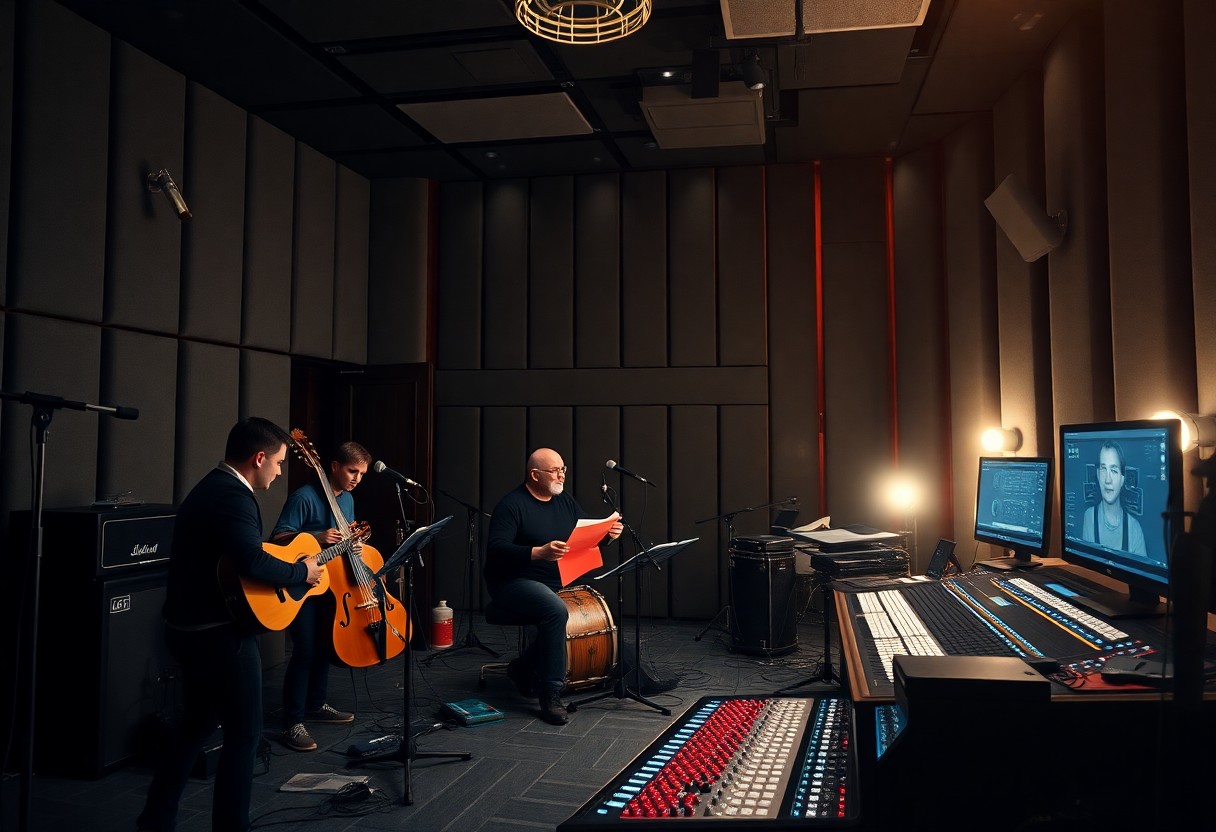Studio time can be a transformative experience for your band, but it also comes with challenges. To ensure a smooth and productive session, come prepared with well-rehearsed material and a clear vision for your sound. Communication with your producer is key, as it can significantly enhance your creative process. Also, keep an open mind to feedback and be ready to adapt during recording. These tips will empower you to make the most of your studio experience, leading to a polished and professional final product that showcases your artistry.
Key Takeaways:
- Invest in quality equipment to ensure professional sound production.
- Prepare thoroughly by rehearsing and organizing song structures before entering the studio.
- Communicate openly with the producer and sound engineer to align on your vision.
- Utilize a proper vocal warm-up and practice to avoid fatigue during recordings.
- Be flexible and open to feedback to enhance the overall quality of the project.
- Schedule breaks to maintain creativity and focus throughout the recording sessions.
- Plan for post-production activities, including mixing and mastering, to achieve a polished final product.
Pre-Studio Preparation
For successful recording sessions, adequate pre-studio preparation is vital. Take the time to plan your musical direction and understand the goals for your time in the studio. This involves organizing your schedule, determining which songs to record, and setting expectations for the recording process. The more prepared you are, the smoother and more productive your studio experience will be.
Song Arrangements and Rehearsals
Song arrangements and rehearsals are fundamental to achieving the best sound. You should have each song fully arranged and practiced to ensure that every member of your band is comfortable with their parts. This collective effort will enhance your performance and allow for more precise recording sessions.
Equipment Check and Maintenance
By ensuring your gear is in top condition, you set the stage for high-quality recordings. Regular maintenance and checks on your instruments and equipment can prevent issues that may arise during sessions.
The condition of your equipment directly impacts the quality of your recording. Inspecting your instruments for any damage and ensuring microphones and cables are functioning properly is vital. This includes cleaning your gear, tuning instruments, and replacing worn-out strings. Moreover, keeping emergency backup gear ready could save you time and frustration during studio time. As a result, thorough maintenance not only protects your investment but also reinforces a positive and professional studio environment.
Studio Selection
Some factors play a vital role in choosing the right recording studio for your band. Look for a studio that aligns with your musical style and vision. Consider the atmosphere, location, and the studio’s track record with similar genres. A studio that captures your creative essence will not only enhance your music but also ensure a comfortable recording environment where you can thrive.
Budget Considerations
The financial aspect of studio selection cannot be overlooked. Establish a clear budget by considering both recording time and any additional costs, such as mixing and mastering. Weigh your options carefully to find a balance that fits your needs without compromising on quality.
Technical Capabilities and Equipment
Any recording studio worth your investment should have top-tier technical capabilities and up-to-date equipment.
For instance, look for studios equipped with high-quality microphones, mixing consoles, and soundproofing features that genuinely enhance your recordings. Ensure they have the necessary software for editing and post-production to achieve your desired sound. The right technical setup will not only facilitate an efficient recording process but also elevate your final product, helping you stand out in a competitive industry.
Time Management
Despite the creative nature of music production, effective time management is necessary for maximizing your recording studio success. You need to balance your artistic expression with the limited hours available in the studio. By prioritizing tasks and setting concrete deadlines, you can enhance your productivity and ensure you make the most of your recording sessions.
Session Planning
At the beginning of your recording process, you should develop a comprehensive session plan. This involves detailing what songs will be recorded, the specific parts to focus on, and the necessary arrangements. By having a clear outline, you can streamline your workflow and ensure that you cover all important aspects during your time in the studio.
Recording Schedule Optimization
With an optimized recording schedule, you can enhance your studio time effectiveness. Planning your sessions to align with the energy levels and availability of your band members will lead to better performances and outcomes. Additionally, keeping track of the time spent on each track will help you avoid unnecessary delays and stay focused on completing your project.
Session organization is key to achieving your overall goals, which involves blocking out dedicated time for individual parts and activities. Allocate specific periods for vocal takes, instrumentals, and any necessary overdubs to prevent your team from feeling rushed. Be wary of time creep, where distractions can eat into your schedule, and try to incorporate short breaks to maintain focus and creativity. Prioritizing an efficient recording schedule not only maximizes your time but significantly contributes to the overall quality of your final product.
Performance Techniques
After entering the studio, your performance techniques can significantly impact the quality of your recording. Focus on honing your skills, both individually and as a band. It’s important to maintain energy and emotion, as these elements will resonate with your audience. Practice your songs until you’re comfortable and confident, and don’t hesitate to explore creative variations during recording. This way, you can capture authentic moments that highlight your artistry.
Microphone Placement and Usage
Behind every great recording is proper microphone placement. Experiment with different distances and angles to find the sweet spot that captures the rich tones of your instrument or vocals. Be mindful of the room’s acoustics, as they can enhance or detract from your sound. Using quality microphones tailored to your performance type can also elevate your recording quality significantly.
Multiple Takes Strategy
By taking advantage of a multiple takes strategy, you can explore creative variations in your performance. Recording several takes allows you to select the best parts later, enhancing your final product’s overall quality. Ensure each take captures distinct nuances, providing you a wealth of options during the mixing process for a polished sound.
Usage of a multiple takes strategy not only enriches your recording but also encourages experimentation. Each take can reveal unique interpretations or unexpected moments that bring depth to your music. Be mindful to maintain your energy throughout all takes, as consistency is key without losing the rawness of your performance. With this approach, you create a richer canvas from which to construct your ultimate sound, making production decisions easier later on.
Working with Studio Personnel
Many artists underestimate the value of collaboration with studio personnel. The relationships you build with the engineers and producers can significantly shape your recording experience and final product. By approaching these professionals with respect and openness, you can create a supportive atmosphere that fosters creativity and results in a polished sound. Engaging positively with the studio team allows you to tap into their expertise, which is vital for achieving your artistic vision.
Communication with Sound Engineers
Beside musical talent, clear communication with sound engineers is fundamental. They need to understand your artistic goals, preferred sounds, and specific requirements. Share your vision openly and encourage feedback; this cooperative approach will help bridge the gap between your creative ideas and the technical implementation, ensuring you get the best possible outcome in the studio.
Accepting Professional Feedback
Working with experienced studio personnel means you’ll often receive valuable feedback on your music. Keep an open mind and be willing to adjust your ideas based on their expertise. This can elevate your project, but it may initially feel challenging to accept such critiques.
It is important to view feedback as an opportunity for growth instead of a personal critique. Accepting constructive criticism allows you to enhance your craft and achieve a higher quality recording. Acknowledging the studio personnel’s experience and expertise means you can improve your sound while also nurturing a positive working relationship. Use their insights to refine your music, but also maintain your artistic integrity. Embrace the process as a partnership that will lead to your success.
Post-Recording Process
Unlike the recording phase, where you laid down the foundation of your tracks, the post-recording process is where the magic truly happens. This phase involves refining your sound and shaping your music into a polished final product. It is vital to approach this stage with an open mind, as the decisions made now will significantly impact your band’s overall sound. Allow yourself to collaborate closely with your audio engineer and producers to achieve the vision you have for your music.
Mixing Expectations
For you to achieve the best sound possible, setting realistic mixing expectations is key. This process can take time, and it’s vital to communicate your goals clearly with your mixing engineer. Outline what aspects of your recorded tracks you want to highlight, be it vocals, instruments, or the overall vibe of the song. A successful mix should enhance your sound and complement your band’s identity without overshadowing it.
Revision Rounds
Post-recording, you’ll inevitably go through multiple revision rounds, and this is where your creative ideas can really flourish. Each round is an opportunity to fine-tune your tracks and incorporate feedback from your bandmates and sound engineers. Keep an open line of communication throughout this process, as it fosters collaboration and ensures everyone’s vision aligns. As you refine your music, don’t shy away from suggesting changes you believe could elevate your sound, whether that means altering mixes or even re-recording certain sections to achieve the desired impact.
In addition, during revision rounds, be prepared for constructive criticism and stay focused on your artistic goals. Your ability to adapt can significantly enhance the final product, allowing room for creativity while maintaining the essence of your music. Don’t forget to trust your instincts, as you are the one who knows your band’s sound best. A balanced approach to feedback will not only strengthen your tracks but also reinforce the unity within your band as you collectively pursue the ideal version of your music.
Final Words
Hence, achieving success in a recording studio requires a blend of preparation, creativity, and professionalism. By understanding your artistic goals, collaborating effectively with your team, and being open to feedback, you can enhance your recording experience. Invest time in planning your sessions and ensure you choose the right studio that aligns with your vision. Your attitude and willingness to adapt will significantly impact your results, ultimately making your music resonate with audiences. Stay focused on your craft, and success will follow.
FAQ
Q: What are some necessary tips for optimizing my band’s studio time?
A: To maximize your studio time, it’s important to arrive well-prepared. This means having all your songs arranged and rehearsed thoroughly. Create a clear agenda for your recording session that outlines which tracks will be recorded at what times. Additionally, communicate openly with your sound engineer about your vision for the sound and any specific elements you want to achieve. Don’t forget to take care of your voices and instruments beforehand and ensure all gear is functioning properly.
Q: How can we ensure the best sound quality during recording?
A: Achieving high sound quality starts with selecting the right studio that suits your band’s style and sound. Invest time in mic placement and acoustics; using the right microphones can dramatically influence the final mix. It’s also beneficial to work with a knowledgeable sound engineer who has experience in your music genre. Pay attention to isolating instruments to prevent bleed, and make sure to take several takes to capture the best performance.
Q: What role does songwriting play in a successful recording session?
A: Strong songwriting is foundational for a successful recording. Before entering the studio, ensure that your songs have been refined and arranged thoughtfully. Collaborate within the group to discuss any last-minute changes or enhancements. It’s also helpful to test your songs in a live setting, as this can highlight areas for improvement. Engaging in constructive feedback sessions can also enhance the overall quality of the songwriting ahead of recording.
Q: How can we maintain a positive atmosphere in the studio?
A: A positive atmosphere in the studio leads to better creativity and productivity. Foster a supportive environment by encouraging open communication among band members. Celebrate small victories and progress to keep morale high. Take regular breaks to recharge, and consider playing some relaxing music during downtime. Also, encourage a sense of playfulness during recording; sometimes, experimenting with sounds can lead to unexpected and exciting results.
Q: What aspects should we focus on during the mixing and mastering process?
A: During the mixing and mastering stage, focus on achieving a balanced sound where every instrument can be clearly heard without overpowering others. Pay attention to the dynamics and ensure that the overall volume levels are consistent. Consider the emotional flow of the album; transitions between songs should feel seamless. Engaging with a skilled mixer and mastering engineer can greatly enhance your sound, so don’t hesitate to seek professional help if possible.









